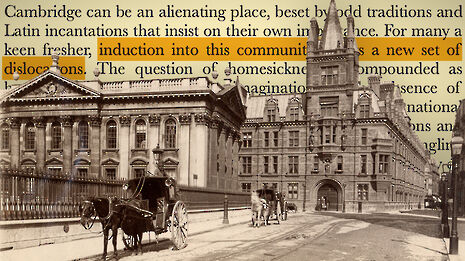Write a Long Read for Varsity
Do you have something to say which can’t be constrained by length or style? Write a Long Read for Varsity

Varsity is looking for writers interested in long-form, captivating pieces that capture the heart of their subject matter.
Up to 3,000 words in length, long reads are some of the highest quality journalism Varsity publishes. These articles are inventive and intensive, often combining interesting interviews and rigorous research with a wide variety of styles, and provide depth where others may have only skimmed the surface.
If you are interested in writing a long read for us, please send us a pitch (up to 200 words) at longreads@varsity.co.uk by 5pm, Sunday September 30th. We’re interested in how you would go about researching your subject matter, as well as how you would present the finished piece.
You may pitch an article on any of the following topics, as well as on an original idea:
Drilling into the Divestment Debate: Divestment has been a dominant story at the University in recent years, with protests, claims of failing University democracy, and, recently, resignations from senior figures in the finance office. A long read could examine the history of the debate in Cambridge, using interviews and archives to examine how various sides developed, and where the issue might lead in the future. Similarly, an article might compare Cambridge’s campaign with other universities and institutions, which have produced very different outcomes.
Accessing Academia: Academia appears to be becoming increasingly an competitive career. We are interested in a Long Read which investigates different routes into the profession and speaks to any students who might think the academic life is for them. How do young academics cope with the difficulties they face? Are their academic interests sidelined by administrative duties? How do the experiences of certain intersections – such as BME academics – compare with others? Do hidden problems exist for access?
The lives of college staff: During the summer, the majority of the University’s student body disappears. Yet Cambridge’s colleges continue to run, all thanks to another set of residents: their staff. We would love to see a human interest piece, interviewing staff about their working days and the hidden secrets of the city.
Mental health in research: As young researchers face increasingly marketised work environments, tougher competition for posts, years of accruing debt and a work-hard-work-hard culture, it is unsurprising that mental illness is becoming a growing area of discussion for academia. What experiences have researchers in Cambridge had? Are there patterns to be found? And what do mental health experts at the University have to say?
The development of “Corporation Cambridge”: This slogan has been repeated ever more loudly by campaign groups on the student left over the past year. It was used during the recent strikes to link the divestment campaign to pressures on academia, democratic failures in the University and increasing marketisation in higher education. What is the origin of “corporation Cambridge” as a slogan? Which policies does it respond to? And how does it relate to Cambridge as a dominant player in national debates on universities?
The forgotten history of women at Cambridge: We often hear stories of what it was like to be among the first women to be admitted into previously all-male colleges. The story of how women were first allowed to take Cambridge degrees is well told. However, women have also been involved and associated in many unofficial ways during the University’s history – ways that are often overlooked. What was it like to be a trainee nurse recruited to come to Clare Ents in the 1970s? How was it to study whilst being denied the opportunity to graduate?
Cambridge in the spotlight: Every year, hundreds of articles appear in the national press, all focusing on the University. From the Sun snapping students at Caesarian Sunday and the Daily Mail papping bleary-eyed party-goers after May Balls, to countless Guardian articles examining Cambridge’s access statistics and relevance in the world – Cambridge is barely ever out of the headlines. What stereotypes do these stories perpetuate, and how closely do they reflect reality? How has coverage of the University changed over the decades? This piece would likely require a dive into the archives to explore the media’s love-hate entrancement with this city and its institutions.
Don't hesitate, we can't wait to hear from you
 Interviews / You don’t need to peak at Cambridge, says Robin Harding31 December 2025
Interviews / You don’t need to peak at Cambridge, says Robin Harding31 December 2025 Comment / What happened to men at Cambridge?31 December 2025
Comment / What happened to men at Cambridge?31 December 2025 News / Unions protest handling of redundancies at Epidemiology Unit30 December 2025
News / Unions protest handling of redundancies at Epidemiology Unit30 December 2025 News / Varsity’s biggest stories of 202531 December 2025
News / Varsity’s biggest stories of 202531 December 2025 News / Downing investigates ‘mysterious’ underground burial vault 29 December 2025
News / Downing investigates ‘mysterious’ underground burial vault 29 December 2025









